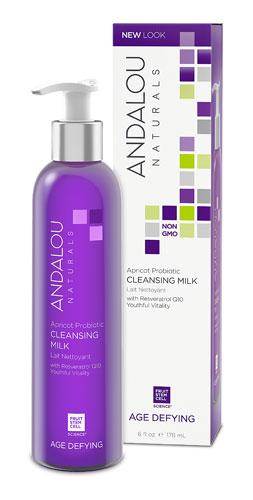Apricot oil is a lightweight plant-based oil extracted from apricot kernels, and it’s rich in vitamins, such as
vitamin C, A and E, as well as antioxidants and essential fatty acids to nourish, hydrate and protect skin. Being so nutrient-dense, it’s an excellent ingredient particularly for aging skin, as it contains anti-aging properties to promote a more youthful appearance and taut texture. It is a versatile skincare agent for daily use with hydrating and soothing effects for all skin types.
Apricot oil is known for having moisturizing properties due to its high concentration of fatty acids and being anti-inflammatory, where using it topically can help to calm and prevent skin irritation, redness and any other symptoms or indicators of inflammation in skin. It’s generally lightweight, fast-acting for more noticeable results when applied consistently and found in various topicals.
Plus, you can even DIY a high-antioxidant,
anti-aging mask or scrub at home with apricot oil as an active ingredient for brightening and balancing skin tone at home. The same goes for your body, as it’s important to regularly
exfoliate the body and remove dead skin cells for a fresh glow and smooth, hydrated feel.
“Because of its non-greasy texture and quick absorption rate, it's commonly used in serums, moisturizers and exfoliants to support skin softness, radiance and overall health,” says
Dr. Anna Chacon, MD, FAAD, board-certified dermatologist based in Miami. These are the benefits of using apricot oil in skincare and best tips for application and use in order to maximize results.
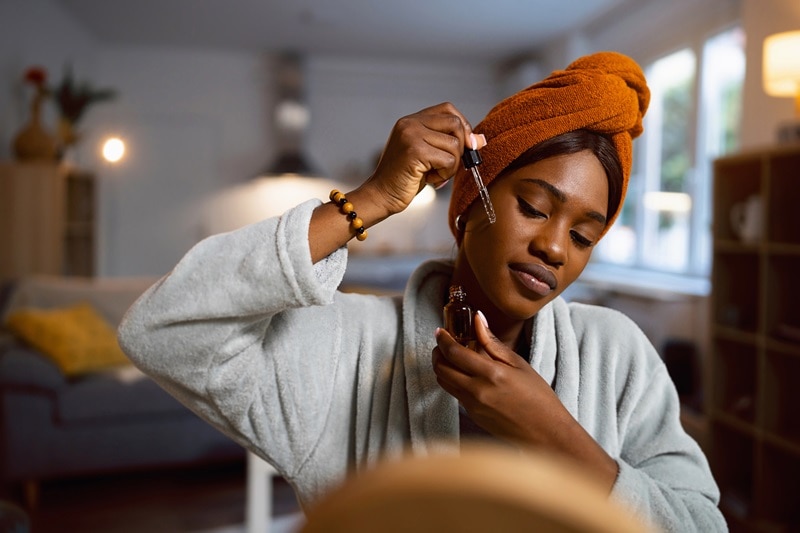
Apricot Oil Benefits for Skin Care
Here’s why you should incorporate apricot oil in your skincare routine, especially as you age:
1. Rich in antioxidants
Apricot oil contains antioxidants, such as
vitamin E, which help neutralize free radicals caused by UV rays and pollution and combat premature aging. It’s great to use in a serum daily, especially in the morning, for protecting skin from environmental stressors. Chacon suggests applying serum or moisturizer under a
sunscreen to boost skin's natural defense. Or, choose a
serum with SPF for daytime wear and sun protection.
2. Boosts collagen production
“Apricot oil supports collagen production, which improves
skin elasticity and reduces the appearance of fine lines and wrinkles,” Chacon explains, with a tip to use it in a night serum or cream to maximize absorption during skin’s overnight repair cycle.
3. Brightens & exfoliates skin
The oil's emollient and vitamin-rich profile helps lift dullness and promote gentle exfoliation, revealing smoother and brighter skin. “Use apricot oil in a scrub 2–3 times weekly for a refreshed, radiant complexion,” Chacon says.
4. Improves dark spots & skin tone
Its anti-inflammatory and antioxidant properties help
fade hyperpigmentation and promote a more even skin tone as well as target
dark spots or any other complexion issues directly for correction. For best results, Chacon recommends using at night, applying to targeted areas in a
cream, scrub or
cleanser, or as a daily brightening serum.
5. Has omega fatty acids
Apricot oil is rich in omega-6 and omega-9 fatty acids, which reinforce the skin barrier and prevent moisture loss for sustained, good hydration and softer, supple skin. “It’s great when used as a
facial oil or layered under
moisturizer—especially for those with dry or sensitive skin,” Chacon says.
Apricot Oil Products to Try for Healthy Skin
Apricot oil is found in various topicals, including facial serums, exfoliants or scrubs, moisturizers and sunscreens for daytime use, as well as night creams to wear overnight. Here are a few best options to try for healthy and radiant looking skin and anti-aging effects.
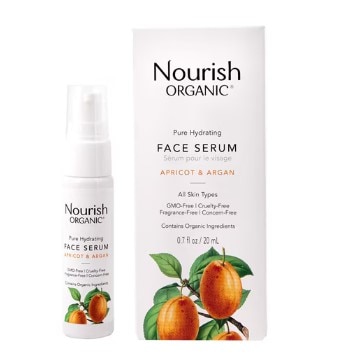
This serum blends apricot and argan oils—both high in antioxidants and fatty acids—to deliver hydration, elasticity and skin-brightening benefits.
“Apricot oil softens and soothes, while argan oil enhances moisture retention and elasticity, making this serum ideal for daily use to promote smoother, more radiant skin,” Chacon says. You can apply it day or night based on preference.
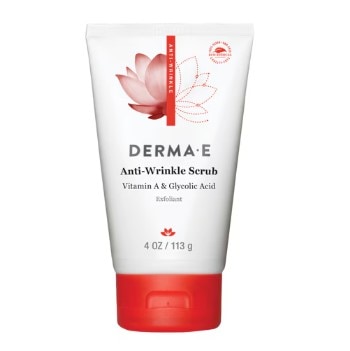
For fighting wrinkles, this exfoliating and anti-aging scrub contains antioxidants, vitamin A, papaya and apricot seed powder, glycolic acid for gentle exfoliation and marine plant extracts for purifying and deep-cleansing pores for a fresh and even tone. Reduced oil prevents breakouts, which is ideal for oily skin types, and apricot seed powder brightens skin. Another option is a
face scrub with apricot seed powder, charcoal and green tea for enhanced detoxifying and daily dose of antioxidants for anti-aging effects. Or try this DIY
charcoal mask.
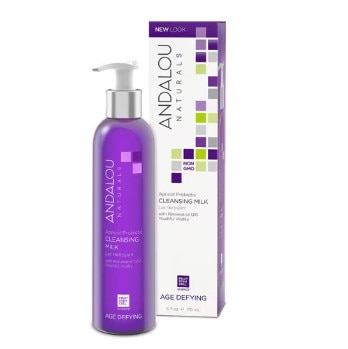
Probiotics nourish skin and keep the microbiome balanced for healthy aging. This face wash has a soothing effect for fighting inflammation and irritation. It’s especially helpful for sensitive and dry skin types, as the milky texture and probiotics boost hydration and cell turnover for anti-aging. Apricot oil brightens skin, treats pigmentation and retains moisture. Combine with a probiotic
moisturizer overnight for enhanced absorption or
mask for repairing and hydrating skin.
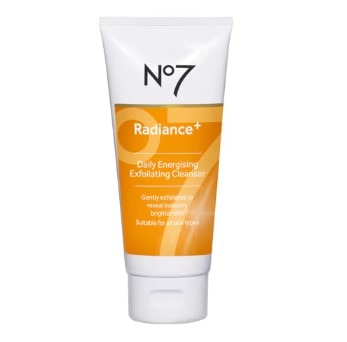
This vitamin C-packed,
brightening facial cleanser has apricot seed and fruit extracts to purify pores and remove dead skin cells with light exfoliation, revealing a brightened, fresh complexion and even skin tone. While it works great on all skin types, it’s an excellent choice for people with oily skin, as daily exfoliation helps minimize oil buildup on skin and prevent breakouts. Since it’s high in vitamin C and antioxidants, it’s crucial to wear sunscreen in the day after cleansing to avoid sun damage and protect against UV rays, as skin is particularly susceptible to sunburn.
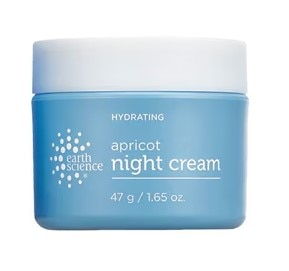
This night cream combines apricot oil and vitamin E to nourish, repair and deeply hydrate the skin overnight.
“It helps to soften fine lines, improve skin tone and restore moisture
while you sleep, making it a great addition to an anti-aging nighttime routine,” Chacon says. Exfoliate first with a
facial scrub. “Formulated with apricot seed powder, this scrub offers gentle exfoliation to remove dead skin cells without irritation, and combined with moisturizing apricot oil leaves skin soft, smooth and visibly brighter—suitable even for sensitive skin types,” Chacon adds.
 This serum blends apricot and argan oils—both high in antioxidants and fatty acids—to deliver hydration, elasticity and skin-brightening benefits.
“Apricot oil softens and soothes, while argan oil enhances moisture retention and elasticity, making this serum ideal for daily use to promote smoother, more radiant skin,” Chacon says. You can apply it day or night based on preference.
This serum blends apricot and argan oils—both high in antioxidants and fatty acids—to deliver hydration, elasticity and skin-brightening benefits.
“Apricot oil softens and soothes, while argan oil enhances moisture retention and elasticity, making this serum ideal for daily use to promote smoother, more radiant skin,” Chacon says. You can apply it day or night based on preference.
 For fighting wrinkles, this exfoliating and anti-aging scrub contains antioxidants, vitamin A, papaya and apricot seed powder, glycolic acid for gentle exfoliation and marine plant extracts for purifying and deep-cleansing pores for a fresh and even tone. Reduced oil prevents breakouts, which is ideal for oily skin types, and apricot seed powder brightens skin. Another option is a face scrub with apricot seed powder, charcoal and green tea for enhanced detoxifying and daily dose of antioxidants for anti-aging effects. Or try this DIY charcoal mask.
For fighting wrinkles, this exfoliating and anti-aging scrub contains antioxidants, vitamin A, papaya and apricot seed powder, glycolic acid for gentle exfoliation and marine plant extracts for purifying and deep-cleansing pores for a fresh and even tone. Reduced oil prevents breakouts, which is ideal for oily skin types, and apricot seed powder brightens skin. Another option is a face scrub with apricot seed powder, charcoal and green tea for enhanced detoxifying and daily dose of antioxidants for anti-aging effects. Or try this DIY charcoal mask.
 Probiotics nourish skin and keep the microbiome balanced for healthy aging. This face wash has a soothing effect for fighting inflammation and irritation. It’s especially helpful for sensitive and dry skin types, as the milky texture and probiotics boost hydration and cell turnover for anti-aging. Apricot oil brightens skin, treats pigmentation and retains moisture. Combine with a probiotic moisturizer overnight for enhanced absorption or mask for repairing and hydrating skin.
Probiotics nourish skin and keep the microbiome balanced for healthy aging. This face wash has a soothing effect for fighting inflammation and irritation. It’s especially helpful for sensitive and dry skin types, as the milky texture and probiotics boost hydration and cell turnover for anti-aging. Apricot oil brightens skin, treats pigmentation and retains moisture. Combine with a probiotic moisturizer overnight for enhanced absorption or mask for repairing and hydrating skin.
 This vitamin C-packed, brightening facial cleanser has apricot seed and fruit extracts to purify pores and remove dead skin cells with light exfoliation, revealing a brightened, fresh complexion and even skin tone. While it works great on all skin types, it’s an excellent choice for people with oily skin, as daily exfoliation helps minimize oil buildup on skin and prevent breakouts. Since it’s high in vitamin C and antioxidants, it’s crucial to wear sunscreen in the day after cleansing to avoid sun damage and protect against UV rays, as skin is particularly susceptible to sunburn.
This vitamin C-packed, brightening facial cleanser has apricot seed and fruit extracts to purify pores and remove dead skin cells with light exfoliation, revealing a brightened, fresh complexion and even skin tone. While it works great on all skin types, it’s an excellent choice for people with oily skin, as daily exfoliation helps minimize oil buildup on skin and prevent breakouts. Since it’s high in vitamin C and antioxidants, it’s crucial to wear sunscreen in the day after cleansing to avoid sun damage and protect against UV rays, as skin is particularly susceptible to sunburn.
 This night cream combines apricot oil and vitamin E to nourish, repair and deeply hydrate the skin overnight.
“It helps to soften fine lines, improve skin tone and restore moisture while you sleep, making it a great addition to an anti-aging nighttime routine,” Chacon says. Exfoliate first with a facial scrub. “Formulated with apricot seed powder, this scrub offers gentle exfoliation to remove dead skin cells without irritation, and combined with moisturizing apricot oil leaves skin soft, smooth and visibly brighter—suitable even for sensitive skin types,” Chacon adds.
This night cream combines apricot oil and vitamin E to nourish, repair and deeply hydrate the skin overnight.
“It helps to soften fine lines, improve skin tone and restore moisture while you sleep, making it a great addition to an anti-aging nighttime routine,” Chacon says. Exfoliate first with a facial scrub. “Formulated with apricot seed powder, this scrub offers gentle exfoliation to remove dead skin cells without irritation, and combined with moisturizing apricot oil leaves skin soft, smooth and visibly brighter—suitable even for sensitive skin types,” Chacon adds.



